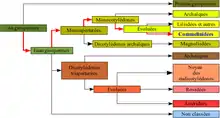Centrolepidaceae
La famille des Centrolépidacées regroupe des plantes monocotylédones ; elle comprend une quarantaine d'espèces réparties entre 3 et 5 genres.

| Règne | Plantae |
|---|---|
| Sous-règne | Tracheobionta |
| Division | Magnoliophyta |
| Classe | Liliopsida |
| Sous-classe | Commelinidae |
| Ordre | Restionales |

| Clade | Angiospermes |
|---|---|
| Clade | Monocotylédones |
| Clade | Commelinidées |
| Ordre | Poales |
| Famille | Centrolepidaceae |
Ce sont des plantes herbacées ou à l'aspect de mousses des zones tempérées à tropicales de l'Asie du Sud-Est et de l'Australasie. On trouve Gaimarda aussi dans l'Amérique du Sud.
La famille classification classique de Cronquist (1981)[1] plaçait la famille dans les Restionales. La classification phylogénétique APG II (2003)[2] et la classification phylogénétique APG III (2009)[3] situent cette famille dans l'ordre des Poales. Toujours au sein des Poales, la classification phylogénétique APG IV (2016)[4] replace les espèces dans la famille des Restionaceae.
Étymologie
Le nom vient du genre Centrolepis qui vient de centr (aiguille, épine, éperon) et lepis (écaille)[5] pour qualifier la structure des inflorescences enfermées dans une paire de bractées munies de pointes en forme de feuilles.
Liste des genres
Selon DELTA Angio (20 avr. 2010)[6] :
- genre Aphelia (en) R.Br.
- genre Brizula (en) Hieron.
- genre Centrolepis (en) Labill.
- genre Gaimardia (en) Gaudich.
- genre Pseudalepyrum (en) = Centrolepis
Selon World Checklist of Selected Plant Families (WCSP) (20 avr. 2010)[7] :
- genre Aphelia (en) R.Br. (1810)
- genre Centrolepis Labill. (1804)
- genre Gaimardia Gaudich. (1829)
Selon Angiosperm Phylogeny Website (18 mai 2010)[8] :
- genre Aphelia (en) R.Br.
- genre Brizula Hieron.
- genre Centrolepis Labill.
- genre Gaimardia Gaudich.
Selon NCBI (20 avr. 2010)[9] :
- genre Aphelia (en)
- genre Centrolepis
- genre Gaimardia
Liste des espèces
Selon World Checklist of Selected Plant Families (WCSP) (20 avr. 2010)[7] :
- genre Aphelia R.Br. (1810)
- Aphelia brizula F.Muell. (1866)
- Aphelia cyperoides R.Br. (1810)
- Aphelia drummondii (Hieron.) Benth. (1878)
- Aphelia gracilis Sond. (1856)
- Aphelia nutans Hook.f. ex Benth. (1878)
- Aphelia pumilio F.Muell. ex Sond. (1856)
- genre Centrolepis Labill. (1804)
- Centrolepis alepyroides (Nees) Walp. (1849)
- Centrolepis aristata (R.Br.) Roem. & Schult. (1817)
- Centrolepis banksii (R.Br.) Roem. & Schult. (1817)
- Centrolepis caespitosa D.A.Cooke (1980)
- Centrolepis cambodiana Hance (1876)
- Centrolepis cephaloformis Reader (1902)
- Centrolepis ciliata (Hook.f.) Druce (1917)
- Centrolepis curta D.A.Cooke (1992)
- Centrolepis drummondiana (Nees) Walp. (1849)
- Centrolepis eremica D.A.Cooke (1986)
- Centrolepis exserta (R.Br.) Roem. & Schult. (1817)
- Centrolepis fascicularis Labill. (1804)
- Centrolepis glabra (F.Muell.) Hieron. (1873)
- Centrolepis humillima F.Muell. ex Benth. (1878)
- Centrolepis inconspicua W.Fitzg. (1904)
- Centrolepis minima Kirk (1892)
- Centrolepis monogyna (Hook.f.) Benth. (1878)
- Centrolepis muscoides (Hook.f.) Hieron. (1873)
- Centrolepis mutica (R.Br.) Hieron. (1873)
- Centrolepis pallida (Hook.f.) Cheeseman (1906)
- Centrolepis pedderensis W.M.Curtis (1985)
- Centrolepis philippinensis Merr., Philipp. J. Sci. (1907)
- Centrolepis pilosa Hieron. (1873)
- Centrolepis polygyna (R.Br.) Hieron. (1873)
- Centrolepis strigosa (R.Br.) Roem. & Schult. (1817)
- genre Gaimardia Gaudich. (1829)
- Gaimardia amblyphylla W.M.Curtis (1985)
- Gaimardia australis Gaudich. (1829)
- Gaimardia fitzgeraldii F.Muell. & Rodw. (1903)
- Gaimardia setacea Hook.f. (1853)
Selon NCBI (20 avr. 2010)[9] :
- genre Aphelia
- Aphelia brizula
- Aphelia cyperoides
- genre Centrolepis
- Centrolepis aristata
- Centrolepis fascicularis
- Centrolepis monogyna
- Centrolepis pilosa
- Centrolepis strigosa
- genre Gaimardia
- Gaimardia fitzgeraldii
- Gaimardia setacea
Notes et références
- (en) Arthur Cronquist, An Integrated System of Classification of Flowering Plants, New York, Columbia University Press, (ISBN 0-231-03880-1, OCLC 1136076363, lire en ligne)
- (en) Angiosperm Phylogeny Group, « An update of the Angiosperm Phylogeny Group classification for the orders and families of flowering plants: APG II », Botanical Journal of the Linnean Society, Wiley-Blackwell, Linnean Society of London et OUP, vol. 141, no 4, , p. 399–436 (ISSN 0024-4074 et 1095-8339, DOI 10.1046/J.1095-8339.2003.T01-1-00158.X)
- (en) Angiosperm Phylogeny Group, « An update of the Angiosperm Phylogeny Group classification for the orders and families of flowering plants: APG III », Botanical Journal of the Linnean Society, Wiley-Blackwell, Linnean Society of London et OUP, vol. 161, no 2, , p. 105–121 (ISSN 0024-4074 et 1095-8339, DOI 10.1111/J.1095-8339.2009.00996.X)
- (en) Angiosperm Phylogeny Group, « An update of the Angiosperm Phylogeny Group classification for the orders and families of flowering plants: APG IV », Botanical Journal of the Linnean Society, Wiley-Blackwell, Linnean Society of London et OUP, vol. 181, no 1, , p. 1-20 (ISSN 0024-4074 et 1095-8339, DOI 10.1111/BOJ.12385)
- André Cailleux et Jean Komorn, Dictionnaire des racines scientifiques : 3ème édition revue et augmentée de plus de 1200 entrée nouvelles, Paris, SEDES-CDU, , 264 p. (ISBN 2-7181-3708-8), p. 60, 145
- DELTA Angio, consulté le 20 avr. 2010
- WCSP. World Checklist of Selected Plant Families. Facilitated by the Royal Botanic Gardens, Kew. Published on the Internet ; http://wcsp.science.kew.org/, consulté le 20 avr. 2010
- Stevens, P. F. (2001 onwards). Angiosperm Phylogeny Website. Version 14, July 2017 [and more or less continuously updated since]." will do. http://www.mobot.org/MOBOT/research/APweb/, consulté le 18 mai 2010
- NCBI, consulté le 20 avr. 2010
Liens externes
- (en) Référence Flora of China : Centrolepidaceae
- (en) Référence Kew Garden World Checklist : Centrolepidaceae
- (en) Référence Angiosperm Phylogeny Website : Centrolepidaceae ()
- (en) Référence DELTA Angio : Centrolepidaceae Desv.
- (en) Référence Catalogue of Life : Centrolepidaceae Tribus Diplanthereae (consulté le )
- (en) Référence Paleobiology Database : Centrolepidaceae Endlicher
- (fr+en) Référence ITIS : Centrolepidaceae Endl.
- (en) Référence NCBI : Centrolepidaceae (taxons inclus)
- (en) Référence GRIN : famille Centrolepidaceae Endl. (+liste des genres contenant des synonymes)
- (en) Référence FloraBase (Australie-Occidentale) : classification Centrolepidaceae
- Portail de la botanique